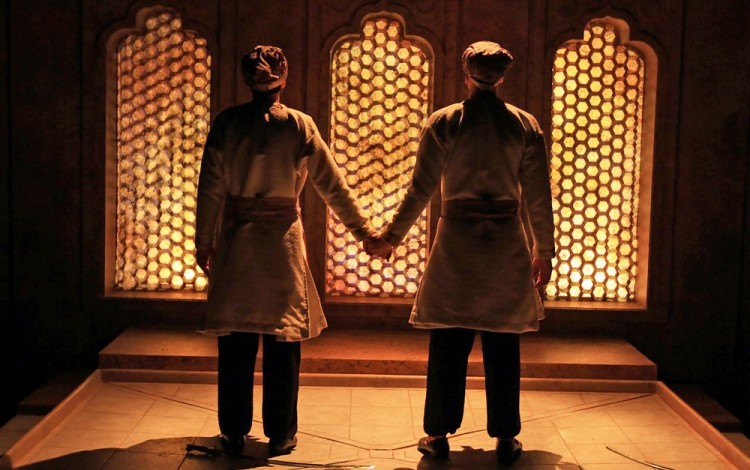
Guards at the Taj, by Rajiv Joseph. Deborah Block directed at Theatre Exile, Philadelphia.
Shah Mirza Jahan was a cultured patron of the arts. His reign in the 17th century was considered the golden age of architecture in the lands of India and Persia over which he ruled. He had another side, however. One wonders how he’d respond to this critique of his tyranny and sadism.
Jahan’s name means “king of the world” and his most famous building was the white marble Taj Mahal which he erected in memory of his favorite wife. He hired 20,000 architects and artisans from all over his empire for the project, which took 20 years to complete. Then Jahan ordered the chopping off of the hands of all of those men to make sure that they could never construct a building that might equal the Taj in beauty.
Guards at the Taj is set in front of the Taj Mahal’s entrance, just before the completion of the building, and it presents the Shah’s brutality in gory detail, offset by the humorous banter of two longtime friends.
They are assigned to guard the Taj. Humayun (played by Anthony Mustafa Adair) is an efficient follower of rules. Babur (Jenson Titus Lavallee) is the opposite. He arrives late, holds his sword with the wrong hand, and keeps breaking rules — such as the silence that the guards are supposed to maintain. Babur is an undisciplined nature-lover with imaginative dreams about flying machines. Humayun lives in fear of his father and of all authority figures, and he always follows the rules, no matter how unjust they seem. But he also has a sensitive side and knows the distinctive sounds of many birds.
In a vividly brutal scene, the two young men carry out the behanding, and we recoil at the sight of them awash in red blood that splashes onto the first row of seats.
Babur says “I don’t want the Taj Mahal to be the last beautiful thing ever built.” For questioning the Shah’s orders, Babur is condemned as a traitor and his best friend must administer the punishment.
The script specifies that the actors have no accent. They speak in standard American, intentionally using colloquial slang. The intent, clearly, is to make the ancient tale relevant to our time. (Rajiv Joseph’s earlier play, Bengal Tiger at the Baghdad Zoo, involved a similar act of violence but was set in the Iraq War.) And the play shows that an autocratic ruler can focus on whatever engages his fancy, and be cavalier with his decisions.
The drama reveals Humayun’s conflict between submission to the law under which he was raised and humane disobedience, and his fear leads him to comply with powerful and brutal authority. Deborah Block’s sensitive direction reminds us that, in 2016, Americans are being encouraged to be afraid of their neighbors and to bestow power on authoritarian rulers who promise “greatness.”
Colin McIlvaine’s set was lit atmospherically by Drew Billiau, while Brad Pouliot’s sound design included period instrumental music and eerie echo effects.
Please share your thoughts with us. Address to editor@theculturalcritic.com
Read other reviews on The Cultural Critic